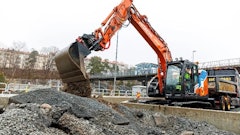
Intense competition by road contractors and a drop in oil prices delivered more bang for the buck during the road construction season to residents in Eugene and other parts of Lane County, officials say.
Streets were repaved or rebuilt in Eugene and elsewhere this spring and summer at less-than-expected cost, mainly because of recession-inspired competition among contractors and a decline in oil prices that lowered asphalt costs.
Oil is a major component in asphalt, and contractors use vast amounts of diesel and gasoline to operate trucks and heavy equipment.
The same economic factors played a role in road rebuilding by the state Department of Transportation, Lane County and individual cities. The state oversaw the $11.2 million repaving and reconstruction of 19 miles of Highway 126 east of Florence, plus other high-profile jobs, including improvements to the Belt Line Road-Coburg Road interchange in north Eugene.
"It's been very busy," said Department of Transportation spokesman Rick Little. "I don't know if it's a record year, but it's very close."
Taxpayers weren't the only ones benefitting from the construction activity. Residential and commercial development ground to a halt in the recession; the public road projects are helping construction firms survive.
There is fierce competition for the road projects among the construction firms.
In a typical year, Lane County might get three to five bidders on a road project, County Engineer Bill Morgan said.
This year, 15 to 20 firms submitted bids for the same road projects, many of them companies from outside the area.
"There was a tripling of interest, from Bend to Portland and points in between," Morgan said.
With such competition, total bids for county road work came in about 15 percent -- or $500,000 -- less than last year, he said.
Contractors "were hungry for work and the competitive bidding process worked to the benefit of the county," Morgan said. "Ultimately, it's the taxpayers who benefitted."
The savings were even greater in Eugene, which completed more than 80 lane miles of road work this construction season. Officials believe that could be a one-year record.
City engineers previously had estimated that it would cost $22.2 million to complete 21 separate road projects. The final cost: $16.7 million, nearly 25 percent less that the estimate.
"We were able to do a lot of streets for considerably less than we estimated, which means the public got a great deal," Public Works spokesman Eric Jones said.
The lower-than-estimated costs will allow the city to do more road work next year, he said.
"This year, we were able to save $5 million, and that savings will be applied to doing more work in the future," Jones said.
With its nickel-a-gallon gas tax and a five-year bond measure to pay for street work, Eugene accomplished more than other cities. Springfield, for example, performed regular street maintenance, but budget pressures prevented it from hiring contractors for major street rebuilding.
Lane County and Creswell combined on a $2.2 million project to rebuild Harvey Road on the north side of Creswell. The final bids were low enough that the city was able to extend the repaving work farther into town and onto another street, Morgan said.
The recession prompted companies to submit low bids so they could get work and keep employees.
Eugene engineers, for instance, figured it would cost $2.9 million to rebuild portions of Crest Drive, Storey Boulevard and Friendly Street in south Eugene. However, the lowest bid, by Delta Construction, came in at $2.1 million.
Delta co-owner Lee Babb said he submitted the "net cost," or no-profit, bid so he could keep employees working during the tough financial times.
Delta is being hit hard by the recession, mainly because commercial and residential construction in Eugene-Springfield has virtually disappeared, he said. Delta had to cut its work force from 70 employees two years ago to 40 employees today, Babb said.
The job cuts would have been worse without the public work, particularly Eugene's projects, he said.
Eugene Sand & Gravel and its sister companies in Eugene and elsewhere had to cut their work force from about 500 employees two years ago to 225 employees today, President K.C. Klosterman said, Without the public jobs, "many of our locations would have to shut down and we would be working with a very small set of people," he said.
Governments are stretching dollars farther, which is good for taxpayers, but some smaller firms that use low bids to get jobs may not do quality work, Klosterman said.
Babb, of Delta Construction, said the government work will be essential for the next couple of years, too.
"The economy is just difficult, and it's not going to get better for another two years," he said.
To see more of The Register-Guard, Eugene, Ore., or to subscribe to the newspaper, go to http://www.registerguard.com. Copyright (c) 2009, The Register-Guard, Eugene, Ore. Distributed by McClatchy-Tribune Information Services. For reprints, email [email protected], call 800-374-7985 or 847-635-6550, send a fax to 847-635-6968, or write to The Permissions Group Inc., 1247 Milwaukee Ave., Suite 303, Glenview, IL 60025, USA.















